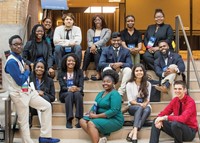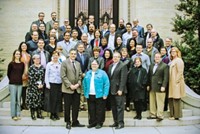Advertisement
Grab your lab coat. Let's get started
Welcome!
Welcome!
Create an account below to get 6 C&EN articles per month, receive newsletters and more - all free.
It seems this is your first time logging in online. Please enter the following information to continue.
As an ACS member you automatically get access to this site. All we need is few more details to create your reading experience.
Not you? Sign in with a different account.
Not you? Sign in with a different account.
ERROR 1
ERROR 1
ERROR 2
ERROR 2
ERROR 2
ERROR 2
ERROR 2
Password and Confirm password must match.
If you have an ACS member number, please enter it here so we can link this account to your membership. (optional)
ERROR 2
ACS values your privacy. By submitting your information, you are gaining access to C&EN and subscribing to our weekly newsletter. We use the information you provide to make your reading experience better, and we will never sell your data to third party members.
Environment
Learning Out Of The Lab
For Ph.D. students, organizing symposia for ACS national meetings cultivates workplace skills, opens doors
by A. Maureen Rouhi
March 21, 2011
| A version of this story appeared in
Volume 89, Issue 12

Johanna Wolfson represented graduate students in the delegation of the U.S. National Committee for the International Union of Pure & Applied Chemistry (IUPAC) that attended the festivities launching the International Year of Chemistry in Paris on Jan. 27 (C&EN Online Latest News, Jan. 27). A fifth-year graduate student working with chemistry professor Keith A. Nelson at Massachusetts Institute of Technology, Wolfson got the opportunity to compete for a place in the delegation as a result of her participation in MIT’s Graduate Student Symposium Planning Committee (GSSPC), which organized the symposium “Chemistry & Policy: Solving Problems at the Interface” for the American Chemical Society national meeting last fall in Boston.
Being in Paris celebrating chemistry with hundreds of delegates from all over the world was unexpected icing on the cake of the GSSPC experience. The one-day symposium addressed the role of chemistry in helping shape policies to encourage innovation and solve problems in energy, security, public health, water, and agriculture.
In addition to the immense satisfaction of pulling off a highly successful event featuring marquee speakers—including MIT chemistry professor and former director of the Central Intelligence Agency John M. Deutch and Harvard University chemistry professor George M. Whitesides—the GSSPC experience, Wolfson and her colleagues tell C&EN, helped them develop leadership skills and professional networks.
Planning for the symposium began in 2008, when most of the MIT GSSPC team were just finishing their first year or were in their second year of graduate school. During the two years it took to conceive and execute the program, Wolfson says, “I learned or improved upon skills that are of immense importance in the business world but not emphasized in graduate school,” such as grant writing and networking.
“I learned a lot about fund-raising, publicity, and organizing a team,” says Jan M. Schnorr, a graduate student working with Timothy M. Swager.
“I realized that the energy drawn from collaborating closely with a team on a project with a clear purpose and deadline was much more invigorating than my more individualistic pursuits in the lab,” says Jared S. Silvia, a graduate student in the group of Christopher C. Cummins. The experience, he continues, made him reconsider his academia-focused career trajectory. He recently accepted a management consulting position, he tells C&EN, “something I probably would never have considered if I had not been part of the planning committee.”
“As a young scientist, I’m always wondering how my work can be influential in the public sphere,” says Brett Van Veller, a graduate student also working with Swager. The GSSPC activity “allowed me to seek out those who are succeeding in this difficult endeavor,” he says.
And Brian Walker, a graduate student working with Moungi G. Bawendi, says he realized “there is tremendous interest at the ACS not just in science policy but also in helping graduate students.”
GSSPC is an ACS initiative that encourages chemistry graduate students to organize symposia for programming under the ACS Division of Chemical Education at national meetings. Although the ACS Office of Graduate Education offers staff assistance and a small sum for publicity costs, GSSPC groups are independent and run on their own steam. It is completely up to the team to select a topic, invite speakers, raise funds, publicize the event, and handle logistics. Each GSSPC also must select a future GSSPC to ensure the program’s continuity. The University of Connecticut GSSPC recruited the MIT GSSPC.
Five of the 10 MIT GSSPC members work in Swager’s lab. Swager says he always encourages students to participate in activities that will help them grow as professionals. “Learning how to organize, how to manage will help them be successful in the rest of their career,” he says. “It also helps me to get them better jobs because I can write about these things in recommendation letters.”
Swager served as the team’s informal adviser, although he claims “absolutely no credit” for the team’s success. According to Walker, Deutch helped the team focus the symposium topic on “problems, rather than feel-good talks about funding a research program.” Deutch’s mentorship during the planning stages was essential to the team’s success, Walker says.
“I was pleased to assist the very capable group of graduate students,” Deutch tells C&EN, “because they were interested in the future of chemistry, which is in fact in their hands.” The students, he explains, delivered a symposium about “how chemistry can and should contribute to the solution of important social problems.”
Joseph S. Francisco, who was ACS president last year, attended parts of the chemistry and policy symposium last fall. “All of you did a fantastic job,” he told the team in Boston. The symposium must have left a strong impression on Francisco, because when the U.S. National Committee of IUPAC decided to include a graduate student in their Paris delegation, Francisco, a committee member, suggested contacting the MIT GSSPC team. And from applications from several team members, the committee selected Wolfson.
By many measures, the MIT GSSPC fall symposium in Boston exceeded expectations. Next week at the ACS national meeting in Anaheim, another GSSPC team aims to be at least as successful.
Six Ph.D. students from the University of Texas, Austin, will be hosting the symposium “Unleashing Electrochemistry’s Potential: Resistance Is Futile,” on Monday, March 28. “We have a topnotch roster of speakers,” says UT Austin GSSPC member Stephen Fosdick, a graduate student working with Richard M. Crooks. The distinguished list includes Allen J. Bard of UT Austin; Andrew G. Ewing of the University of Gothenburg, in Sweden; William R. Heinemann of the University of Cincinnati; Julie V. Macpherson of Warwick University, in England; Charles R. Martin of the University of Florida; and Henry S. White of the University of Utah.
Working with the UT Austin GSSPC has been “very pleasant, very professional,” Martin says. Like the graduate student organizers, he hopes to convey the excitement of electrochemistry—“that it’s cool and interesting and solving a lot of exciting problems”—to the general audience that he expects at the symposium. Organizing this symposium gives UT Austin GSSPC members a rare opportunity to work with some of the “living legends” in the field, he says. “It’s thrilling when you meet people you admire and want to emulate.”
Organizing an event of the magnitude of an ACS national meeting symposium is a first-time experience that is proving valuable, Fosdick says. Not only is he learning how to address the logistical challenges of a big event, but he also sees in the symposium a “good platform” from which he and his colleagues can share with other students what, he says, “you can do with electrochemistry that might not come to mind when looking at it from a textbook or class.”
To the UT Austin team, MIT’s Schnorr sends good wishes: “After a long time of hard work choosing a topic, finding speakers, getting funding, and advertising the symposium, you are finally at your goal. Now, almost everything is organized and you can enjoy your symposium. We hope that you will look back at your work in a few weeks and see that it is indeed possible to make at least a small difference as graduate students, even at a large conference like the ACS national meeting. Good luck.”






Join the conversation
Contact the reporter
Submit a Letter to the Editor for publication
Engage with us on Twitter